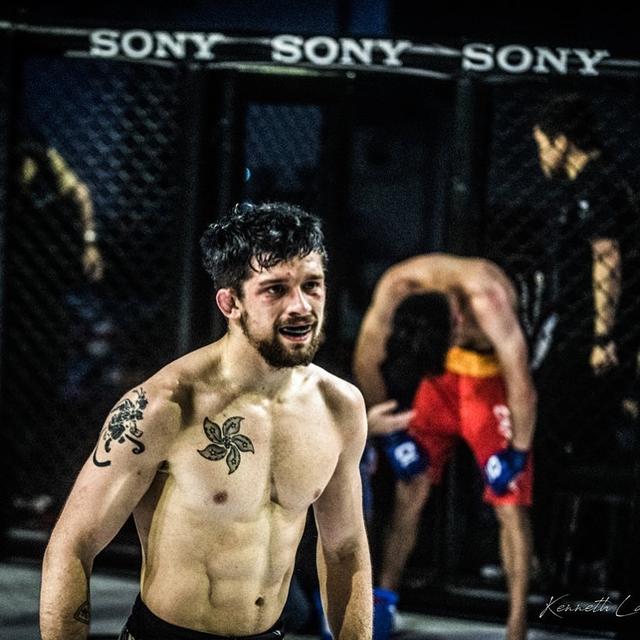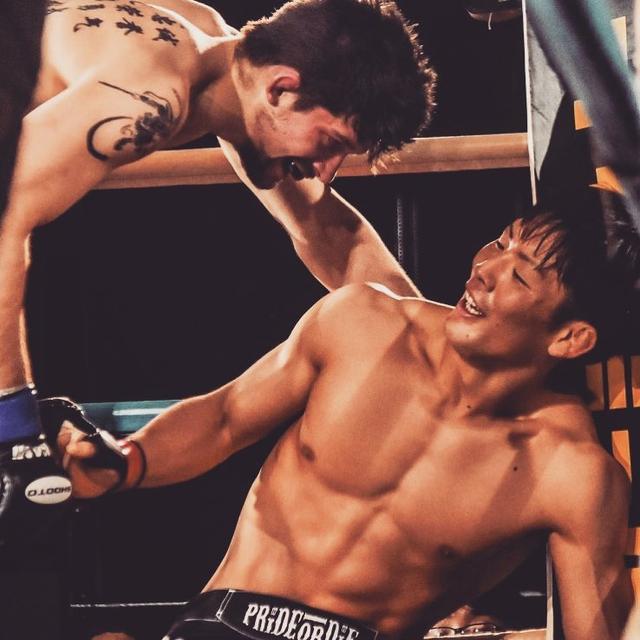American pro MMA fighter Max Leali and his fight to put Hong Kong in the ring

A few minutes every morning is all you need.
Stay up to date on the world's Headlines and Human Stories. It's fun, it's factual, it's fluff-free.
On Bonham street in Sheung Wan, Hong Kong, where there is a noticeable concoction between Eastern and Western influence, sits a martial arts training center – Versus Performance. Within the gym, a handful of former and current fighters (MMA, Muay Thai, boxing) train and teach a mixture of wannabe and professional fighters. Prior to the COVID-19 pandemic, this is where Max Leali spent most of his time. Up by 5 a.m. and training and teaching until late in the evenings, “it’s my home," he says.
Mixed Martial Arts (MMA) fighting, otherwise known as cage fighting, is a lucrative, but secretive business. The sport is a combination of different fighting styles originating from cultures around the world united into one art form. Every year, several major brands or promotions come together to tour and showcase their best MMA fighters around the world – one of which, of course is the Ultimate Fighting Championship, or UFC. But the journey for any professional fighter climbing the ranks (assuming they do) or any budding amateur fighter wanting to turn pro is tough and cutthroat – and Leali’s has been no different.
I met with a masked Leali in Sai Ying Pun Memorial Park surrounded by slightly obnoxious gym-junkies blaring mainstream hip-hop music on a gloomy Tuesday afternoon. Unimposing and quirky, Leali is tattooed with Chinese characters, the Hong Kong flag’s orchid tree and an East Asian god on his body. He fits, yet defies the stereotypes one would immediately associate with a professional fighter.
I started properly speaking to Leali when I signed up for a boxing session. “Oh yeah, no worries, I have all the time in the world right now," he replied.
Our conversations initially remained superficial, focusing on what I needed to do and couldn’t do. “Chin down, jab. Uppercut. That’s the wrong arm. What was that?"
Very quickly I knew that I wanted to interview Leali, but observing him for two sessions, one thing was clear – he was hyper-aware. Not wanting this to transform into self-consciousness, I held off on the request and instead waited for two more sessions before I finally asked.
He chuckled, “Yeah I’m an open book, ask me anything."
Born in a small town in Ohio with a population of just 5,000, Leali was thrown into a different world when he and his family moved to Hong Kong when he was only 11 years old. “I remember just as a kid never feeling at home … I just didn’t feel comfortable. I remember getting here and then feeling like it was home almost immediately … Just a feeling."
Leali was first introduced to contact sports as a tween playing rugby where he almost made the national team. He recalled looking down at his hands and smiling. “I just got used to getting hit, and I realized I liked contact sports,” he explains. But it wasn’t until a near fistfight at the age of 13 that Leali’s dad pulled him aside and said, “if you’re gonna do that, you should learn to do it right."
“So I started learning martial arts after that,” he recalls.
His initial love for the sport was driven by industry stars like Forest Griffin. “I remember watching Forest Griffin, he was one of the first winners of a series called ‘The Ultimate Fighter’ and he won against Rampage Jackson, Stephan Bonnar, Shogun Rua, and those three fights in particular … made me want to fight so bad.”
Leali then met his mentor, Quentin, at 13 who he describes as his “second dad.”
“He was pretty harsh with me,” Leali explains, “I mean in a good way … I had standard teenage stuff. Ego, pride, anger,” he chuckles.
“Quentin was always very quick to beat the shit out of me if he felt like I needed it,” he says. It was also Quentin who signed Leali up for his first fights – fights that he knew Leali had no chance of winning. “He would sign me up for fights all the time and just say ‘hey you’re fighting.’ So obviously, I got my ass kicked.”

Leali then met his next mentor, Phil – owner of Versus Performance and Leali’s boss, who he refers to as “Uncle Phil.”
“Yeah, Phil has always been very good at helping me get energy out. He used to always make me yell ‘I am a cucumber!’ because ‘cool as a cucumber.’ So he used to always be like, ‘what are you?’ and I would be like ‘I’m a cucumber!’ and he would laugh and respond ‘fucking idiot,’” Leali laughs.
Now Phil helps Leali look for fights to compete in.
Leali has only been technically pro for several years, but he has already experienced great highs as a professional MMA fighter, with 2018 marking his most victorious year. Turning pro at the tender age of 20, he became the first person to represent Hong Kong in the All Japan Amateur Shooto Championship in 2016, where he placed third. Coupled with that, Leali boasts an impressive Muay Thai career with a record of 7-4. Fast forward two years in 2018, he picked up a nomination for Asia MMA Rookie of the Year and soon appeared on the red carpet in Central, Hong Kong.
However, his success isn’t surprising when you hear about his buildup. For eight weeks leading up to a fight, Leali only has two things on his mind – his opponent and winning. With intense strategic schedule structuring and what Leali describes as “overtraining,” he explains that during fight camp, he thinks to himself, “I’m resting right now and they could be training right now, they could be getting an edge that I don’t have.”
When asked whether that thought made him nervous, he responds, “it doesn’t make me nervous, it makes me train more … But I guess you could perceive it as a kind of nervousness."
A heartbeat
“I often say that ‘a martial artist’s life is a heartbeat – there’s ups and downs,” says Leali.
And he wasn’t wrong – in that same triumphant year, Leali tore his ACL. “In 2018, it was the up part,” Leali recalls. “I had three fights. I won an award for Readers Choice for Asia MMA awards thing and immediately after that, I tore my ACL and then I haven’t fought since then because of COVID. That’s upwards and then straight down where I couldn’t walk … I could barely teach.”

However, despite waiting to get back into the ring for two years, Max doesn’t let it get him down. “I miss it, it’s everything that I want, and I’m dying to compete, but I’m still able to be happy,” he says.
As Leali responds, you can’t help but notice how ideal and well-rounded his answers are. It’s almost hard to imagine that they haven’t been rehearsed. “I try to be the best version of me,” “I can still be happy,” “I want to be the best martial artist, best coach, best boyfriend, best son.”
Living in the era of likes, comments, shares and TikToks that inundate truth and substance, I follow up and question his responses to see whether they are fueled by honesty.
But Leali is nothing short of sincere. So, I shift my focus onto how he obtained such mental equipoise. He then shares his experiences with the deep pits of depression in 2016.
“You win and you feel high in the moment, but that doesn’t last,” he says. “I felt empty. I took fights often that year. I remember that year, there was this time I flew to Japan to be the cornerman for my mentor. He fought, then I flew to Singapore, competed two days in a row. While I was cornering my mentor in Japan though, I took another fight … And I did that regularly. I took a last-minute fight in China that I took while I was on holiday in Paris.”
But then, a friend’s suicide offered Leali perspective and made him reevaluate his own life. “That made me feel very guilty,” he explains. “He was very similar to me in many ways. After that, I realized that none of what I was feeling was who I was as a person and where I wanted to be. It’s not productive.”
Introspective, attune to his own world and yet empathetic to the lives and pain of others, at one point in the interview, he points to his tattoo of Guanyin – the Buddhist bodhisattva on his right triceps and the god associated with compassion – and explains that he genuinely just wants to help people.
“I think some people think that fighters have to be imposing, and I’m definitely not.”





Comments ()